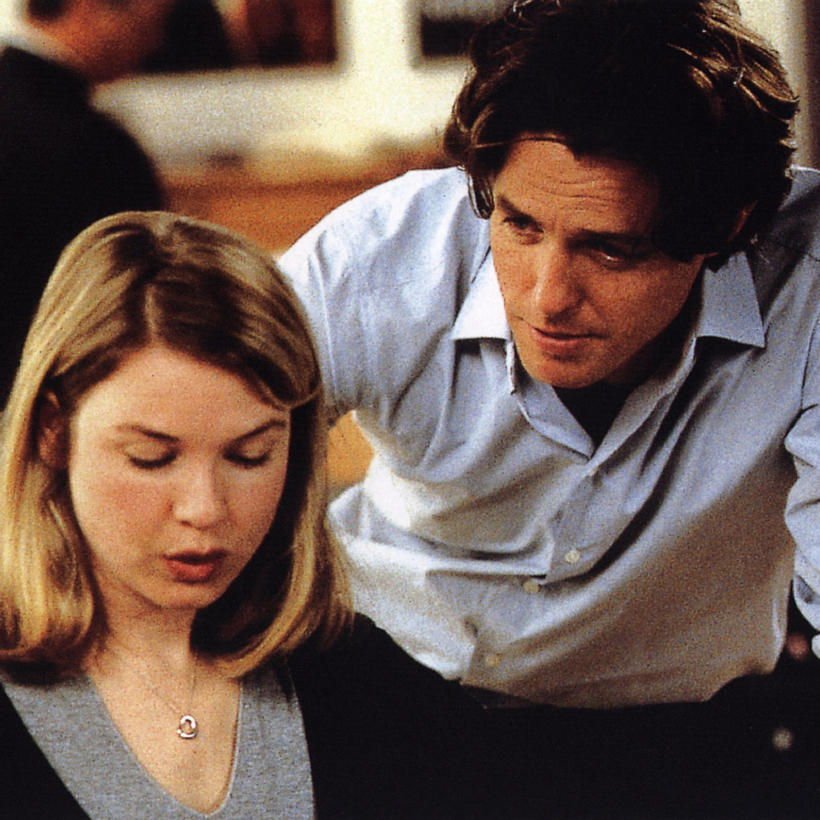Let me take you back to 1996 and the writer Helen Fielding’s set-up of the original Bridget Jones’s Diary story. Bridget is having a fling with her boss Daniel Cleaver after a few flirty messages, then things turn sour when Cleaver sleeps with another colleague, causing Jones to feel compelled to resign.
Fast-forward to 2025, and Rénee Zellweger, who reprises her role as Bridget in Mad About the Boy, the forthcoming fourth film in the series, is admitting that this kind of company-time carousing would probably not withstand scrutiny from today’s human resources departments.
Talking to Vogue, Hugh Grant, who played Cleaver, has a sober, retro-woke thought or two on his character’s exploitative actions towards a junior employee. Had the original Bridget Jones film been made now, rather than in 2001, Grant acknowledges, Cleaver would have had to be “re-educated”. HR would have held a meeting, Zellweger agrees in the same piece, and spoken to him about how staff should “engage” with others.
Engage? Educate? In the febrile offices of media and publishing houses in the Nineties and Noughties absolutely no one spoke like this. There was no one around, certainly not in any official/professional capacity, to do any “educating”. We didn’t call it “engaging” either. Workplace “culture” was not a thing. Instead, we just worked. Got on with it. And sometimes flirted and made out in the back of a (company) car after the Christmas do.
A job in the media world was a high-pressure piss-up, everyone seemingly complicit and on-message to the delicate balance of work and play. After, say, a Jones/Cleaver-style fumble in a minicab on a drunken night, no one would call HR. Mainly because it didn’t exist and was called “personnel”, dealing mostly with hiring and firing. Complaints were made to personnel usually by younger members of staff who felt bullied by their elders.
Engage? Educate? In the febrile offices of media and publishing houses in the Nineties and Noughties absolutely no one spoke like this.
A male features editor I employed, then in his twenties but now a father, writer and un homme sérieux, made a habit of dating girls only within easy reach of his desk. “This seemed like an occupational perk, not a sackable sex crime,” he told me, some thirty years later, still grateful for the opportunities that his job in Nineties publishing afforded him. “It is quite possible that had I not chosen that particular desk, I would never have had any sex at all.”
Daytime drinking, long lunching with staff and naughts-happy expense claims were the norm. While serving as a glossy magazine editor I was once at a trattoria lunch, not far from my office, with a (female) member of my staff. As two o’clock approached I noticed a member of senior management at another table (also with a woman).
Worried that he might think I was taking advantage of office hours — already lax — I paid up and left. Back at my desk, at about 3.30pm I was called to his office. What had I done? Now clearly pissed, my boss told me off for not staying at my dining table for longer. “Lunch here,” he slurred, a glass of postprandial red on his desk, brought to him by his PA, “especially if you are taking out a pretty girl, is from 1pm until 3pm. At least. If you slope off early, after just one hour, you make the rest of us look bad. Understood?”
These were the days when the magazine Christmas party was a three-venue, 12-hour-long sex and drugs bacchanalia. The rest of the year was a Hieronymus Bosch painting dressed in Prada Sport and irrigated by sweet but lethal cosmopolitan cocktails. Two members of staff I worked with had enjoyed company-financed drink and drug rehab at the Priory. The worst thing a woman could say about a male worker was that he was “handsy” or NSIT (not safe in taxis).
And the plot of the original Bridget Jones film? That actually happened, almost to the script’s detail, in a magazine office I once worked in. Rumors abounded, hearts were broken, faces reddened, contracts quietly terminated but personnel never got involved.
The worst thing a woman could say about a male worker was that he was “handsy” or NSIT (not safe in taxis).
Now? No one drinks at lunchtime. Or gets off with another office worker at the Christmas party. There is no country house hotel bed-hopping at overnight conference away days (“have-it-away days”, they used to be called) and absolutely no flirting of any kind during working hours.
I am the only person in my office who may still dare to compliment a woman on her new haircut or get-up. I am quietly but sternly admonished via headshakes when this happens, mostly by men and women in their twenties and thirties.
So what changed? And why did we think, we young men, in our Gap cargo pants, Merrell sneakers and Nicole Farhi suits, that the place of work was also the best place to meet women?
Perhaps because, back then, we only had the rave and the Xerox photocopier to choose from? Before Instagram and Facebook, Hinge and Raya, the office was a mannered, dress-up place that served as a cross between social media and dating apps. You wore a suit and tie and met pretty much everyone you would know — your friends, flings, drinking buddies and life partners —at work. Women wore heels. It was fun.
In 2025 media offices — offices in general — are intentionally boring, distraction-free, quiet, no jokes, un-fun environments. While I still think that a movie called Human Resources wouldn’t be quite the same multiplex proposition as The Wolf of Wall Street, this is progress of sorts. It is much better that women don’t have to have sex with their bosses to get ahead in publishing anymore, and that older staffers are not given carte blanche to paw interns at Christmas parties, but doesn’t the following make for depressing reading?
According to Alan Lewis, partner at Constantine Law, a practice specializing in employment, business immigration, regulatory and business crime, behavior like that of Cleaver’s towards Jones in the Nineties could now very well lead to a tribunal.
“To succeed in a claim of harassment, a claimant will need the employment tribunal to find that the conduct complained of was unwanted. If Jones or her colleagues responded in kind to the romantic advances of Cleaver, that may be a challenge.”
It is much better that women don’t have to have sex with their bosses to get ahead in publishing anymore…but doesn’t the following make for depressing reading?
Granted, Lewis says, the scenario is not unusual, as when people spend many hours together at work romance is bound to blossom. But to avoid complaints of sexual harassment and discrimination, the lawyer suggests that “it is sensible to have, train on and enforce clear policies that emphasize zero tolerance towards this type of treatment in the office”.
In the case of a romantic relationship between co-workers, “both need to be reminded informally of the zero tolerance of anything that might amount to harassment or discrimination”. Ultimately, prevention is the best cure, but if matters get out of hand “a negotiated deal under a signed settlement agreement may be the only sensible option for the company”.
Simon Mills is an editor at Wallpaper and a writer at The Times of London


